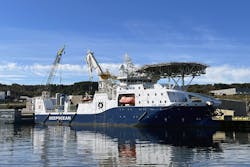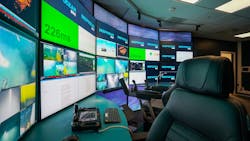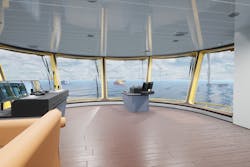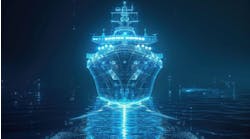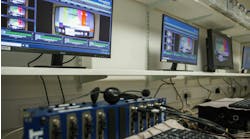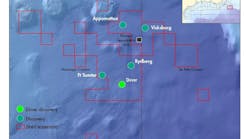Editor's note: A shortened version of this Subsea Systems column first appeared in the January-February 2023 issue of Offshore magazine. Click here to view the full issue.
By Ariana Hurtado, Editor and Director of Special Reports
In late November 2022, ocean services provider DeepOcean announced it secured new subsea contracts from Equinor, ConocoPhillips and bp in the North Sea with a combined value of about $202 million.
The awards involve subsea inspection, maintenance and repair (IMR); subsea construction; removal and recycling of subsea equipment; and subsea survey scopes. The contracts will run until year-end 2026.
In 2023 DeepOcean plans to deploy results from some of its latest technology initiatives, which include construction of an unmanned surface vehicle (USV), use of subsea autonomous inspection drones and integrating its onshore remote operations center with the operators’ offshore operations.
In January of this year, DeepOcean activated an option to request the installation of a battery hybrid system on board the Stril Server multipurpose support vessel. The Stril Server is being chartered from Stavanger-based shipowner Simon Møkster Shipping. The vessel is currently on a two-year time charter agreement with DeepOcean, and it supports the company’s offering within subsea IMR, light construction and recycling services to operators in the offshore renewables and oil and gas industries.
Simon Møkster Shipping will install a 620-kWh battery system from SEAM AS. Stril Server’s control and DP systems will be upgraded, and a system for onshore charging will be installed. The upgrade will be conducted in first-quarter 2024.
The Stril Server is equipped with 2 x Kystdesign ROVs together with DeepOcean’s infrastructure, allowing for remote operations from the company’s remote operations center in Haugesund, Norway.
The company is investing heavily in remote operations for marine and subsea operations. Through the Remota joint venture, formed in June 2022 with Solstad Offshore and Østensjø Group, it will continue to own, operate and develop onshore remote operations centers. Remota offers remote operations and semi-autonomous maritime services to existing vessels and remote operations of ROVs and USVs.
“We will continue to invest in the development of unmanned surface vessels,” Mikaelsen told Offshore. “This type of vessel is capable of considerably reducing operating expenses compared to conventional vessels that are utilized for subsea inspection, maintenance and repair work. The concept of unmanned vessels contributes to all aspects of sustainable maritime operations and can be one way of fast-tracking the green transition within the industry. By enabling more efficient operations, slower sailing speeds and significantly reduced operating costs, it is not only sustainable in terms of reduced environmental footprint, but also in economic and social terms.”
He said it is estimated that the USV solution can reduce CO2 emissions by more than 90% compared to a conventional offshore vessel when conducting subsea operations.
In early December 2022, DeepOcean and Akvaplan-niva inked an agreement to collaborate on potential utilization of ROVs and USVs to perform environmental studies for offshore wind and oil and gas developments. The two parties will work toward combining the field operations of DeepOcean’s ROVs, USVs and autonomous inspection drones with Akvaplan-niva’s environmental data collection services. The partnership also aims to use Akvaplan-niva’s unmanned autonomous glider vehicles commercially for use in environmental studies.
By integrating environmental sensors with the vehicles and streaming the data to a powerful cloud-based processing system, the companies will investigate the opportunity to utilize ROVs, USVs, drones and gliders to perform ecosystem and environmental studies.
For the offshore energy sector’s environmental assessment processes, DeepOcean said combining sensor technology with unmanned and autonomous vessels can substantially reduce use of fossil fuels and associated CO2 emissions.
DeepOcean also has developed a subsea drone, enabling remote pre-programmed operations independent from the surface base. Remote operations with autonomous inspections drones are controlled from the remote operations center, which the company says ensures productivity.
The company also provides digital twins and animation of subsea operations. Animations and interactive projects can simulate offshore and below sea level operations. A digital view of vessels and ROVs in operation, with exact positions and movement, creates a digital twin, which allows the ability to follow offshore operations digitally and record all movements with precise accuracy.


